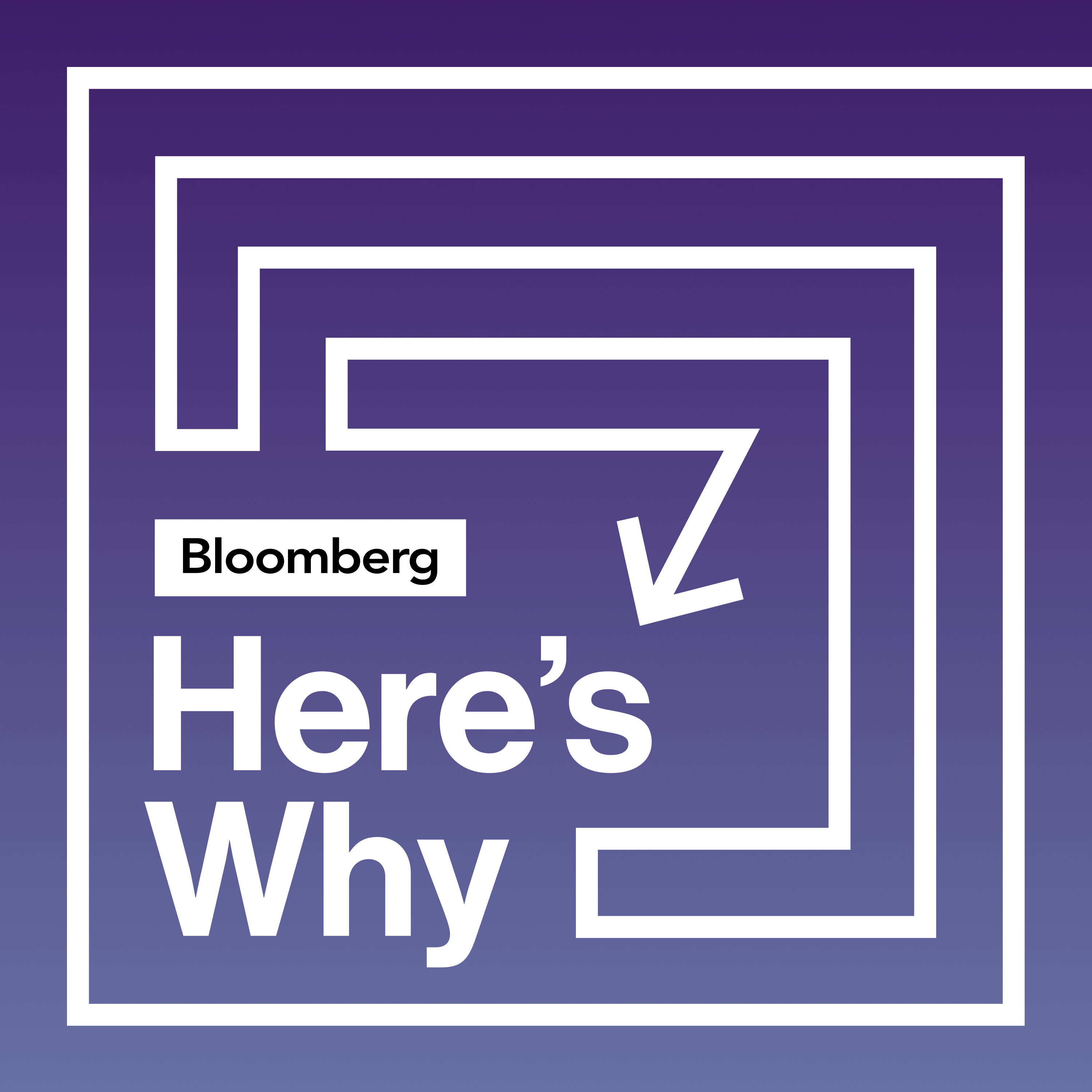
Here's Why Obesity Drugs Are Changing the Food We Buy

Here's Why
Deep Dive
- Hundreds of thousands in the US are using GLP-1 drugs, with the number expected to rise into the millions.
- These drugs significantly reduce appetite, alter taste, and cause gastrointestinal side effects.
- People on these drugs eat smaller portions and opt for lower-calorie foods.
Shownotes Transcript
This is an iHeart Podcast. Thrivent can help you plan your finances for the people, causes, and community you love. What makes Thrivent different? Financial services and generosity programs are combined to help you build a financial roadmap for the future, while also creating opportunities to give back along the way. Visit Thrivent.com to learn more.
Thrivent, where money means more. How can you grow your business from idea to industry leader? Bring your vision to life with smart business buying tools and technology from Amazon Business. From fast, free shipping to in-depth buying insights and automated purchase approvals, they deliver everything you need to achieve your goals. It's not easy to stand out from the crowd. Simplify how you stock up to get ahead. Go to AmazonBusiness.com for support.
Bloomberg Audio Studios. Podcasts. Radio. News. I'm Stephen Carroll and this is Here's Why, where we take one news story and explain it in just a few minutes with our experts here at Bloomberg. Here's Why.
After decades of research, basically, NOVA finds a molecule that changes everything in terms of weight loss drugs. The potential size of this market is massive, right, in the obesity and diabetes market. One of the most transformative drugs on the market today are anti-obesity drugs. They're game changers for those who take them, and they're earning millions of dollars for pharmaceutical companies.
The demand for obesity drugs, like Ozempic and Zepbound, collectively known as GLP-1, has skyrocketed. A study published in May 2024 found one in eight American adults had tried them. As that's likely to rise, food companies have been taking notice of shifting eating habits.
and making changes too. It's actually helping business, but in sort of surprising ways. This like side economy has sort of formed alongside the drugs. So when you are under GLP-1 medication, what you need is high quality protein. The yogurt with high protein, low fat, low sugar is flying off the shelf. They've gotten into the hummus space, pita chips, and also low calorie
and diet sodas. They've been introducing a lot of low-calorie, low-sugar products. So here's why obesity drugs are changing the food we buy. Deirdre Hipwell, who leads our team covering consumer and healthcare companies, joins me now for more. Deirdre, you're perfectly placed to tell us about the two sides of this story. First of all, how widespread is the use of GLP-1 drugs?
Well, certainly in the U.S., we're talking about hundreds of thousands of people. I mean, it's quite hard to give an exact number because more and more people are taking it and prescription rates are just on the rise. So it is a very big market in the U.S. But even in places like Europe, where the drugs are starting to be rolled out, that's, you know, Wegovy, Zempek, Manjaro, as Eli Lilly's drug is known in Europe, are
are rolling out. So I think in a few years' time, we could be talking about millions of people. But for now, we're in the hundreds and thousands territory. And those names evolving as well, as you point out, more of them to add to the list. What effect do these drugs have on people's eating habits? It's pretty dramatic. I mean, a lot of people talk about just the removal of food noise. So for some people, they just completely lose their appetite to the point where they actually have to force themselves to
to eat. People are eating smaller portions, they're eating foods that previously may not have appealed to them. People are eating less high calorie foods. People even report struggling to drink water sometimes because the way these drugs work is they slow down the movement of the food through the system and they reduce your appetite. So you just have a feeling of continual fullness.
And so sometimes that can actually be quite difficult to eat or even drink. And people talk about changing taste, with some people saying that they no longer like the taste of alcohol. So this is really pretty dramatic. Also, these drugs have some quite unpleasant gastrointestinal side effects, including nausea, constipation, diarrhea, which, of course, if you're feeling those effects, will further reduce your desire to eat. So that's why we're seeing such dramatic weight loss.
Now, food companies have been reacting to this as well, some of them announcing some of the changes that they've made. What are they doing? If we go right back to 2023, when these drugs were really entering the public consciousness,
kind of freaked everyone out a bit when they said that they could already see reduced demand for food from their data because, of course, Walmart has a pharmacy line. So they were able to see that people on these drugs were making different shopping choices and were buying less. Since then, there's been this talk that this is going to affect food companies. And, of course, it will. And they're all aware of it and they're all talking about it. One thing I would say, a slight caveat, is that
To be honest, consumer groups have faced a lot of challenges in the last few years. Inflation, returning inflation in some markets, tariffs now dipping consumer sentiment. So it's quite hard to necessarily pin this entirely on GLP-1 drugs, but it's certainly something that they have to think about. And some see it as an opportunity. We have some companies who think that they have products that could
cater to people on these drugs. What sort of products are we talking about? What, I suppose, would be of interest to somebody who's taking one of these drugs? Well, for example, if we look at Nestle, the world's biggest food company, they have some products and supplements that they think help with areas such as muscle loss, which is a problem for people on these drugs. You don't only lose fat, you can lose muscle too. So they have a product, it's like a boost product that you take before a meal and it'll help increase muscle
apparently, the absorption of proteins in the food. They also have some high protein lines. Then you have the French group Danone, which makes probiotic yogurts, which obviously they are marketing as will help with the gastro side effects.
So there's a lot of companies that are talking about their products and how they could help people who are facing quite significant changes to what they like and what they like to eat because people's tastes are changing on these drugs. And are they preparing for this trend then to accelerate? We're talking about the increased development of these drugs. There are more brands coming on the market as well. Is it something that I suppose is going to be a gear shift down the line?
It's definitely something that's only going to accelerate. These drugs aren't going to go away. There's going to be more and more people taking them in Europe and in other markets. Plus, the market is getting bigger in terms of the drugs available. It's no longer just a race between Novo Nordisk, the maker of Wegovy, and Eli Lilly, the maker of Zetbound.
We have more companies coming with more products and that will make it easier for people to get onto these drugs. So I think it's definitely a trend that they're going to have to think about. What are the next key changes that we're watching for in this sector? Moving slightly aside from the drugs, the biggest change in the sector, particularly in the US, is probably going to be the impact of drugs.
and his Make America Healthy Again, because in the short term, that might be more of an immediate challenge for food companies because he wants to move away from ultra-processed food manufacturing. He wants less use of colorants and seed oils and high fructose syrup. So those companies are facing an immediate challenge there because he's going to be probably pushing for some quite significant changes there.
Whereas what's happening with the GLP-1 drugs is significant, but I think it could still take some time before it's really starting to affect.
the bottom line of these companies, because, I mean, these are companies with like tens of billions of revenue. And as I said at the start, you know, we still only have hundreds of thousands of people on this drug. There's still a pretty big addressable market for the food companies. But it's just one more thing that they have to think about. And when we're thinking about the development of the GLP-1 drugs as well, the next generation of these drugs, there's a lot of talk about the pill form of these versus an injection that they are currently being
Is that seen as another big game changer or shift coming down the line? Definitely. I think the obesity pill will be a big, big shift in the market. The first reason is it's easier to take. I mean, at the moment, these drugs aren't necessarily pleasant to take, right? You're having to inject yourself weekly, whereas a pill, you know, it's just something you could take with your morning breakfast.
It's easier to take, but there's also a growing view that the pill format has fewer side effects, which I think is a big factor. Because the one other point to mention on these, these drugs are transforming the way we eat and the way we treat obesity. But there is, for some people, there can be quite a high drop-off rate from these drugs because it's so unpleasant to be on them.
So I think that's why at the moment I still think food companies are in a kind of wait and see before they make any dramatic shifts because these drugs are still relatively new phenomenon. I mean, it's really only been in the last two or three years. So I think in the coming years, we'll see exactly how many people are staying on these drugs and if these shifts that the companies are seeing now are permanent.
But definitely, if I was a food company CEO and the obesity drugs keep coming out with easier to take and to handle drugs, I'd be a bit worried. Deirdre Hipwell, thank you for bringing us your expertise on the consumer and healthcare sectors. For more explanations like this from our team of 3,000 journalists and analysts around the world, go to bloomberg.com slash explainers. I'm Stephen Carroll. This is Here's Why. I'll be back next week with more. Thanks for listening.
This is an iHeart Podcast.